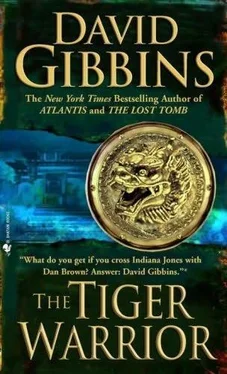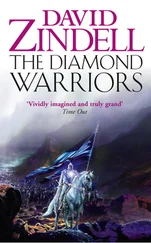David Gibbins - The Tiger warrior
Здесь есть возможность читать онлайн «David Gibbins - The Tiger warrior» весь текст электронной книги совершенно бесплатно (целиком полную версию без сокращений). В некоторых случаях можно слушать аудио, скачать через торрент в формате fb2 и присутствует краткое содержание. Жанр: Прочие приключения, на английском языке. Описание произведения, (предисловие) а так же отзывы посетителей доступны на портале библиотеки ЛибКат.
- Название:The Tiger warrior
- Автор:
- Жанр:
- Год:неизвестен
- ISBN:нет данных
- Рейтинг книги:4 / 5. Голосов: 1
-
Избранное:Добавить в избранное
- Отзывы:
-
Ваша оценка:
- 80
- 1
- 2
- 3
- 4
- 5
The Tiger warrior: краткое содержание, описание и аннотация
Предлагаем к чтению аннотацию, описание, краткое содержание или предисловие (зависит от того, что написал сам автор книги «The Tiger warrior»). Если вы не нашли необходимую информацию о книге — напишите в комментариях, мы постараемся отыскать её.
The Tiger warrior — читать онлайн бесплатно полную книгу (весь текст) целиком
Ниже представлен текст книги, разбитый по страницам. Система сохранения места последней прочитанной страницы, позволяет с удобством читать онлайн бесплатно книгу «The Tiger warrior», без необходимости каждый раз заново искать на чём Вы остановились. Поставьте закладку, и сможете в любой момент перейти на страницу, на которой закончили чтение.
Интервал:
Закладка:
“Sounds sensible to me.” Costas grunted, straining his hands through the rubber wrist seals. “In this case, I’ll go with the folk wisdom any day.”
“Some of the stories may be true. If you study the shoreline, you can see where the level of the lake has fluctuated. It’s a strange place. Hundreds of mountain streams empty into it, but hardly anything flows out. So the level of the lake goes up, or goes down when there are periods of high evaporation, like now. And on top of that, it’s in a major earthquake zone.”
Costas finished pulling on his suit and sat down, picking up a clipboard he had brought with him from the deckhouse. “I’ve got it here. The navy guys were briefed on it. At least three major quakes in recorded history, one about 250 BC, the Grigorevka, another 500 AD, the Toru-Aigir, and another 1475, the Balasogun, all probably eight to nine on the Richter scale, pretty hot stuff” He turned his back to Jack, arching his arms out to tense the shoulder zipper of the suit.
“Right.” Jack yanked the zipper shut and slapped Costas’ back. “The second of those, AD 500, might coincide with the sunken Christian monastery story. But the legend of Genghis Khan doesn’t fit. Genghis died in the thirteenth century AD. His successors were notoriously secretive about his tomb, murdering everyone they encountered during the funerary procession. According to Mongol ritual, horses would have trampled over the site to conceal it. But I think the tomb was where history says it was, at a place called Burqan Qaldun in Mongolia, hundreds of miles to the east of here.”
“What about decoys?” Costas said. “I mean, deliberately misleading stories. If they were so secretive, maybe they spread stories of the tomb being in different places. Hence the legend here.”
Jack nodded. “It’s possible. And not just for concealed tombs, but also for very visible tombs, extravagant ones. For those tombs, it’s the exterior appearance that matters for posterity, for how later generations will see the dead. But the contents usually matter most for the deceased, their private insurance policy for the afterlife. So they can be concealed elsewhere, with the actual body. After all, even the Egyptian pyramids were robbed.”
“And the First Emperor’s tomb at Xian was robbed,” Costas murmured. “By the caretaker, if the jewel story is true.”
Jack stood up, peering at the shoreline. He looked for the Zodiac, for Rebecca, but there was still no sign. He sat down and began to pull the legs of his suit on. “So where exactly are we going in?”
Costas flipped over to another piece of paper on the clipboard. “I printed this off the navigational computer. About two o’clock from us now, half a kilometer out from shore. There’s a creek with a few buildings at the edge.”
Jack shielded his eyes. “I see it.”
“It’s where the profiler came up with that image of walls.”
“It fits with the old Soviet report?”
“It fits exactly with the story from Altamaty, recounted to me by Katya. And I can’t imagine Katya has anything to hide.”
Jack raised his eyebrows, and was silent for a moment. “Well, to reassure you, Altamaty also spoke with Rebecca, in Russian. He said the first reports of underwater finds at this spot came from the Russian explorers who reached this place in the nineteenth century. You remember Sir Aurel Stein, the Silk Route explorer? Well, there were Russians who jumped on that bandwagon too, sent out by the Moscow Geographical Society. It was like an archaeological version of the Great Game, Russians against British. Nobody knows for sure what the Russians found. Such a lot disappeared after the Russian Revolution. But we know that two Russian explorers came down here, Nikolai Przhevalsky and Piotr Semyonov Tianshansky. They’d both heard stories of sunken ruins, cities under the lake. When they came here, the place seemed possessed by it. Tianshansky had been to Venice and found a fourteenth-century map showing an Armenian monastery by the lake. The legend of the tomb of Genghis seems to have been local. Undoubtedly the Russians were fed what they wanted to hear, but they were also shown genuine artifacts that had been found by fishermen.”
“Then fast-forward through the Soviet period.”
Jack nodded, pushing his head through the rubber seal on his suit. “The explorers left, but the legends grew. Nazi fantasists thought this was the Aryan homeland, drawing on local legends that this was a place of purity, a kind of heaven on earth. Then in the 1950s the Soviets established their torpedo testing base here, and divers went into the lake for the first time. As we know, they found something while searching for a lost torpedo, and the Ministry of Interior Security became involved. That ended under Khrushchev in the early 60s as the Cold War heated up and attention was focused elsewhere. Then more years passed, more rumor, more legend. A professor in Bishkek started to talk about Atlantis. That’s when Katya’s father got interested.”
“The family connection. I knew it.”
“The professor was wrong, of course. And Katya’s father never made it here. This place was next on his wish list when we drew a line under his plans two years ago.”
“So what else does Altamaty know about what the Soviets found?”
“The records only give chart coordinates. There’s a huge amount of silt down there, and no record of whether they found the torpedo. But rumors began circulating in Karakol, the local town, where the Soviet personnel lived. They told of ancient walls under the silt, like the converging walls of a great entrance passageway, with Chinese-style carvings. In Karakol there’s a wooden mosque built about a hundred years ago by the Dungan Chinese, Muslims driven west by persecution in China. The mosque looks like a Chinese temple, with dragons on the cornice. The Dungans seem to have fueled the legend of Genghis’ tomb. Katya thinks it’s only a matter of time before the tourist department seizes on the idea and makes it into an embarrassing spectacle, with giant Soviet-style statues of Genghis Khan in the town square. She wants them to invest in the petroglyphs, the real archaeology out here, not some myth, and make that an international attraction.”
Costas folded the sheet over on his clipboard and showed Jack a printout. “Well, whatever it was the divers saw, it seems to fit with the sub-bottom profiler data. To begin with, the profiler just showed linear striations coming down from shore, river runoff eroded into the bedrock. It was Rebecca who first saw how regular one of the channels looked. Almost an upside-down V shape, converging into shore.”
“So it was Rebecca who actually spotted this? She didn’t tell me that.”
“She’s modest. Like you.”
Jack raised his eyebrows. “She’s too busy being spoiled by a team of fifteen U.S. Navy SEALs, you mean.”
“Every one of them a gentleman.”
Jack looked serious. “I don’t want navy divers out here right now. Just us.”
“They’re too busy anyway. There are ticking time bombs in the old Soviet port area, abandoned hulls with nuclear reactors. Where we’re diving is officially a no-go zone. It’s going to take them months to decontaminate out this far. This is our show. Remember, the only reason those Soviet divers came out here was to hunt for a lost torpedo, and they didn’t find it.”
Jack reached into the lake to splash some water on his helmet. “The water’s warm. Just your cup of tea.”
“If it gets any warmer as we go down, I’m out of here faster than you can say Geiger counter.”
“That’s what we’ve got these suits for. You designed them.”
“We’re still going to need a full scrubbing down after this.”
“In Hawaii?”
Читать дальшеИнтервал:
Закладка:
Похожие книги на «The Tiger warrior»
Представляем Вашему вниманию похожие книги на «The Tiger warrior» списком для выбора. Мы отобрали схожую по названию и смыслу литературу в надежде предоставить читателям больше вариантов отыскать новые, интересные, ещё непрочитанные произведения.
Обсуждение, отзывы о книге «The Tiger warrior» и просто собственные мнения читателей. Оставьте ваши комментарии, напишите, что Вы думаете о произведении, его смысле или главных героях. Укажите что конкретно понравилось, а что нет, и почему Вы так считаете.












